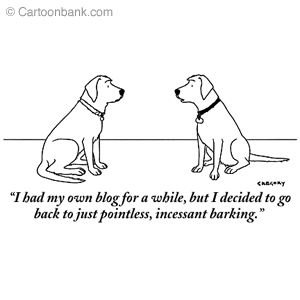If you haven't seen this New Yorker cartoon, you don't hang out in many blogs.

A good test of blogger sanity: Do they love this cartoon? It embraces the flip-side of the warning my friend Rob gave me when I started my blog: "Don't be surprised if the reaction you get is ringing silence."
It's a struggle for some bloggers (read "me") to resolve the question of whether blogs are social or narcissistic.
One stream of thought is that only the self-absorbed would write a theoretically endless stream of stuff that an audience of potentially no-one will read. Others, of course, call that a diary.
Another school says that blogs are inherently social: like inviting everyone to your house for a party. Except without the beer. And doing it every time you fart.
I think most bloggers bear this dire existential crisis by ignoring it altogether. I, however, have taken a braver stance. Entirely immune to false dichotomy, I'm dead certain both views are right. Blogs are both social *and* narcissitic. They're social to the limited degree that verbose loners sitting solo in the dark yearning to have greater intercourse (ahem) with the world can do so without paying by the minute. And they're narcissistic to the degree that anyone who yearns for a creative outlet of any kind disappears up their own fundamental orifice.
But there's one thing I've seen bloggers do that chucks out all pretense of creativity or social motivation and throws down the gauntlet of shameless narcissism as a badge of honor. The shy ones call it autobiography, but the honest label it more plainly: "100 Things About Me".
Damn it all. I'm in!
So, here, in one stream-of-consciousness draft (if I can pull it off), are (subject to revision)...
100 (or so) Things About Me1. I wear an old, ratty Mickey Mouse t-shirt to bed when it's cold. (Since writing this, I have retired the t-shirt. Mickey is now framed, holes and all, and hangs above my desk at home.)
2. My wife and I met on a blind date. It didn't work out. We got together eight years later.
3. Before we were a couple, I tried to set my wife up with one of my close friends. Separately, I introduced her to a man who became one of her tragic loves.
4. My relationship with my wife makes me feel like the luckiest man alive.
5. I'm a good husband.
6. I know I could be a better one.
7. I have a goatee because my wife thinks it makes me look like a pirate and she, uh, likes that.
8. My left ear is pierced twice, to boot.
9. I have two tiny tattoos. Neither is in a racy place. You would never guess what either one is.
10. I'm convinced I'm going to die young, but the time for doing that is quickly slipping past.
11. I'm quite conservative in many ways, just not politically.
12. Most of the big risks I've taken in my life I took out of fear: fear of regret, fear of what sort of person I'd be if I didn't grasp opportunity when it came.
13. Deciding to get married was the biggest decision of my life, but it didn't feel even a little like a risk. I swore I wouldn't walk down the aisle unless I could do it with zero doubt. I worried that might mean I'd never marry. It didn't. Take heart.
14. I have been blessed beyond reason, and far beyond deserving, in both love and friendship.
15. When I love someone, it sticks. It doesn't fade with absence or flee from a fight. Only one person I've ever loved really faded from my heart. It was mutual.
16. I started playing drums when I was 5 years old, and formally trained as a jazz drummer for years.
17. I ended up somewhat outside the jazz genre, playing in bands called things like Dave Master & The Baters, and Running Naked.
18. I hadn't played in more than fifteen years, then did a gig in Bangkok a couple of years back, and raced straight back home and bought a new kit.
19. Steve Gadd, John Bonham, Dave Garibaldi and Butch Miles are my favorite drummers.
20. I was sexually precocious. I lost my virginity quite young, with a much older woman. The relationship didn't last, but while it did, she was a gentle, wise, open and daring teacher. The experience was wholly positive, both physically and emotionally, and I'm certain it shaped the central, positive place sex has held in my life since.
21. My Master's thesis was about pornography and erotica, but I'm a social scientist, so it was full of statistics.
22. The biggest age gap between me and a lover was 17 years.
23. My gums are receding prematurely and they tell me there's not a damn thing I can do about it.
24. My first name is Robert. I go by my middle name because there was a time when just about every man in my extended family was named Robert. Something had to give.
25. I was an asshole to three of the first four women I really loved. The fourth was an asshole to me.
26. I have been extremely blessed by friendship and love all my life.
27. I used to live in Paris.
28. I didn't take it for granted.
29. I have lived in
five six seven countries on four continents (in reverse order: Mongolia, UK, France, China, Australia, United States, Canada) and have travelled in
28 29 30 31 32 33 34 35 36 37 more.
30. I credit my father with instilling my strong -- some have said over-developed -- sense of justice. It is now the source of all the things on which he and I most deeply disagree.
31. He also gave me respect for learning, a love of words, the value I place on being a gentleman, and his example gave me the courage to travel.
32. I often see myself as an extension of him.
33. I think this would shock the shit out of him.
34. I'm a passionate baker. You know I care about you if I show up with bread or cookies.
35. I've been blessed with lots of great teachers in life. I've also had five great mentors: Mom, Dad, Lawrence Rosenfeld, Donald Simpson, and Ron Spithill.
36. I used to work for a large high-tech multinational. Now I work for a big mining company.
37. I used to be a management consultant.
38. When I was a management consultant, and used to fly at the front of the plane a lot, I sat next to Bob Dylan once and, another time, across from Rod Stewart (who was traveling with his then wife, Rachel Hunter). Both were much uglier than any photo of them you've ever seen.
39. I used to be one of Qantas's top frequent flyers. I miss the foo-foo treatment.
40. I once sat at the next table from Ronald Reagan at breakfast. It was long after he was in office, and he was pretty out of it.
41. I revere the political philosophy in the US Constitution and Bill of Rights.
42. I get choked up at several of the monuments in Washington DC.
43. I also revere the example set by Jesus of Nazareth. I think few follow it. Including most Christians.
44. I love dogs. The way some people go for babies, I go for dogs.
45. But not those little rat-sized ones you can step on.
46. My last dog was named Steve. He was beautiful and epileptic.
47. I have been a passionate photographer, and I will be again, but I am not, now.
48. I haven't taken a serious picture in two years and I miss it terribly, but the muse went out for a paper and hasn't come back.
49. I have a photography website that sorely needs updating: www.humanimages.com
50. I own
nine ten cameras.
51. I wish I could draw.
52. I adore the work of Jock Sturges and George Tice.
53. I have a lot of fountain pens. I'm finicky about nibs and ink flow.
54. I always write in purple ink.
55. I'm a paper fetishist. I take the stationery from hotels and spend silly money on handmade stuff.
56. I'm a grammar pedant, but I make lots of mistakes.
57. I believe in god, but not in any conventional form of god. I believe our faculties of perception and understanding are too limited to ever fully grasp the powers that shape the universe and our lives. So, all our notions of god are egotistically reductionist. Most notions of the divine I see are undernourished by wonder and over-fed on naive certainty mistaken for faith.
58. I believe any notion of metaphysical absolute truth is arrogant. And, ultimately, dangerous.
59. I don't have a favorite car.
Actually, I don't have a car. Since moving to the UK, I've had to start driving again. I hadn't missed it.
60. I used to love rollerblading in the streets of Paris.
61. I admire my sister, but I'd never say it to her like that.
62. I love my nephews very much, but am not very close to them. I'm flummoxed by how to connect with them from far away.
63. Five of my ex-girlfriends have gone on to have serious lesbian relationships. Not "experiences" mind you, but relationships.
64. My mom claims this is because I spoiled them for any other man.
65. My mom is inspiring. Most of my friends who've met her want to grow up to be like her. When she climbed the Great Wall of China, she celebrated reaching the top by flashing Mongolia.
66. I've had two step-fathers, both great guys: open and loving.
67. The only time the cops busted one of my high-school parties, my mom was sitting on the hood of a car out in the driveway with a beer in her hand and a balloon tied around her neck.
68. I like wine.
69. A lot.
70. I like throwing dinner parties. It gratifies both my nurturing, creative, social side, on the one hand, and my control freak tendencies, on the other.
71. I'm good at staying in touch with people I care about.
72. I'm in pretty close touch with four friends from high school, but almost none from college/university. Bunch from grad school, though.
73. My oldest and best friend killed himself after becoming a suspect in his wife's mysterious death. They had three sons under five years old, one of whom was named after me. No one knows what happened. We never will. No scenario is good. He was one of the best men I knew. I miss him profoundly.
74. My wife has an extraordinary talent for facilitating emotional bonds between other people.
75.
I don't do any public service or volunteer work. I'd like to. I always intend to. I'm embarrassed that I don't. I spend a lot of time working for youth leadership organisations, including the world's largest student organization, AIESEC, and social entrepreneurship crucible Starting Bloc. Their missions are all about getting leverage on the world's problems by unlocking the potential of young leaders. My life is full of 23-year-olds. I feel lucky and honoured to work with them.
76. I have a huge music collection.
77. I think the winner of World's Saddest Song is a dead heat between Ferron's "Ain't Life A Brook" and the Pogues' version of "And the Band Played Waltzing Matilda".
78. I regret failing to see John Lee Hooker perform while he was alive. Ray Charles, too.
79. Bands like Trooper and Honeymoon Suite are my guilty pleasures.
80. I'm a US citizen.
81. I'm also an Australian citizen.
82. Before I became an Australian citizen, Jesse Helms helped get me Australian residency.
83. I have scuba dived a lot, but not in a long time.
84. I have jumped out of a perfectly functioning aircraft three times.
85. Once, my parachute didn't open. (The reserve chute did.)
86. I have flown soaring planes.
87.
At work, I've been drinking water out of the same big red cup for five years. It finally broke.
88. I have an old favorite pair of boots I've been wearing since my senior year in high school.
89. My taste in writing whip-saws back and forth between artfully crafted prose of rich erudition, on the one hand, and then unadorned no-bullshit directness on the other. I'm glad I don't have to choose between them.
90. I don't
have watch much television.
91. I have a deep emotional attachment to William Gibson's out-of-print masterpiece _A Mass For The Dead_.
92. Many of my friends think I'm generous. I think I'm selfish.
93. I'm pretty sure I don't know what people really think of me.
94. I try not to care too much.
95. But I do, anyway.
96. I love dressing up for occasions; I dislike dressing up for work.
97. I have a small collection of Mao Zedong statues. He was evil, but I'm fascinated by his icon status as China's Elvis.
98. I went on a grand total of one internet date. I flew 2500 miles for it. It was a total bust.
99. Our home is full of Chinese antique furniture, a product of having gotten married while living in China.
100. But my desk is an English Victorian mahogany barrel-top. And it kicks ass.
101. I notice women's shoes and new haircuts.
102. I have kilt envy.
103. I have a rich fantasy life.
104. I hide behind libido and restlessness and desire for financial security and cooking, but, really, I'm just afraid that neither my writing nor my photography are much good.
..











